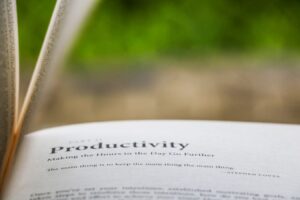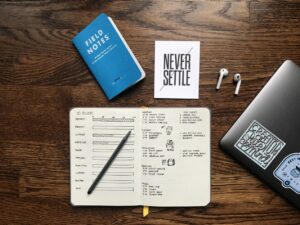Time is finite, there’s only so much of it. When it’s gone, it’s gone. Being more productive means being more efficient. But why is that important? I like Tony Robbins’ approach to productivity which focuses on ways people can systematise and better manage their lives so they have more time to do what they want. There are many ways to increase productivity and here’s a list of things to ensure you’re making the most of your time.

When we procrastinate, we delay things or put off the inevitable. A lot of the time we procrastinate is due to our anxiety. We worry we won’t complete a task in time, or we worry that the output of the task won’t be good enough. This fear of failure makes us avoid things. The thing is, we can beat this feeling if we just start. Bestselling author, Margaret Atwood, describes herself as a “world-class procrastinator”. In a recent podcast, she describes how she has two selves, the ‘want self’ and the ‘should self’. The ‘want self’ is dominated by emotions and instant gratification and the ‘should self’ is about doing the right thing. Margaret says that the ‘want self’ is always stronger, but the ‘should self’ can outwit the impulsive self. What you need to do is get your ‘should self’ to limit distractions, prioritise your tasks and keep you on track.
Neuroscientists have done studies that prove that listening to music activates the pleasure centre in your brain and the effect of this is that it stimulates creative problem-solving. Playing music releases a neurotransmitter called dopamine which makes you feel good and reduces stress and anxiety, enabling us to be more productive and is a powerful way to increase productivity. Author and neuroscientist, Daniel Levitin, writes in his book – This Is Your Brain on Music about a study conducted on surgeons that indicated how music has the ability to increase your concentration with repetitive tasks.

Short of locking yourself into a room with no other stimulation or devices, it’s really easy to get distracted in an ‘always on’ world. Start by identifying all distractions, then switch off all notifications, close web tabs on your laptop, even put things away. Get rid of all clutter so that you can focus better. If you are able to minimise distractions then you can get yourself into a state of flow. When this happens it feels like time disappears and you can just keep going. It often happens when you’re doing things you really enjoy like watching a film, running, gardening or dancing.

It’s important to divide your work up into chunks. Then when you complete one of the chunks, you reward yourself. When you reward yourself your brain elicits positive emotions and wants you to experience these emotions constantly so you feel compelled to do it again and again. It’s for this reason that small wins are so important. A reward could even be some distraction time – you will definitely have earned it!
Multitasking limits efficiency because your brain can only really focus on one thing at a time. If you’re trying to do too many things at once, you risk low-quality output. Another problem with multitasking is that it’s difficult not to get overwhelmed. If there’s too much on the go, you can start to feel out of control. Feeling out of control just increases your stress levels and no one can focus clearly when they’re feeling swamped. Just focus on one thing at a time and try to get it done.

When you have a good night’s sleep you wake up feeling well-rested and ready to tackle the day. Good quality sleep also helps you focus or concentrate better. Exercise is known to reduce cortisol or stress levels, making you feel more resilient to complete the tasks at hand.
Delegate tasks that others can do. There are plenty of companies that you can outsource certain tasks to. You can outsource your office admin to a virtual assistant. You can outsource your social media and marketing requirements to a digital agency. Whatever you decide you can rest in the knowledge that other people are there to help.

Make lists of all the things you need to do. List everything, even if it sounds insane. Then arrange the activities in order of importance. Which activities must be achieved first in order to reach a goal? This is call prioritisation. Establish what is urgent and focus on it. Once completed focus on the next priority or the next activity which you deem as urgent.

High productivity is about working smarter and these tips will go a long way in helping you make sure you get stuff done! Remember, “Ordinary people think merely of spending time, great people think of using it.” — Arthur Schopenhauer.